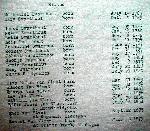The Genealogy Roadshow
Author: Mark W. Swarthout
Published on: August 16, 2002
Unfortunately, not everything we want to find out about our ancestors can be
learned from the internet or through letters. Sooner or later, you're going
to have to travel. It may be a simple as a trip to the library, or one of the
key research centers. Perhaps you're planning that trip to the county courthouse
in that distant state to see if you can find the records you want. Or you want
to visit the homestead and find the graves of the ancestors that bore your name.
Later this month, I'm taking off for the Swarthout Family Reunion in New York.
That's a long way from my desk and files. This leads to a whole new problem.
What do you take with you? How do you balance the reams of paper you already
have and the need to travel light? How about restrictions on what can be carried
into the archive section of the library? You may not be allowed certain items.
Here are some hints and tips for being prepared for the research trips.
Have a plan
The first key is to have some idea of what you expect to accomplish on your
trip or visit. If you are making a once a month trip to the state library, or
if you are making a once in a lifetime visit to another country, you will have
a different scope. The narrower the scope, the easier it is to take the specific
items, files and information you may need. But if you don't know what to expect,
you want to be ready to handle any opportunity that arises.
And review what you already know. Flipping through the sheets and refreshing
your memeory may prevent you from traipsing down a path you have already followed
to a dead end. It will also give you fresh ideas aobut where to start for new
material.
My reunion trip will focus on the Swarthout family, of course. But there is
always the chance that some other branch may suddenly appear, and I want to
be ready to identify any need to research it. Knowing I have Fairchild's in
my line may be well and good, but could it be the one in front of me? I want
to know before I spend too much time on it if there is a possible connection.
I have made trips were the entire purpose was to simple identify all of my ancestors
that fought in the Revolutionary War. I took a working copy of the family tree
with birth and death dates. That was all it took to allow me to look up each
of the appropriate names in the DAR Index.
Cameras

|
This is a must for recording and documenting graves and buildings.
Ensure you have lots of film and the appropriate batteries. Nothing is
more frustrating then finding your fG-grandfather's grave and not having
a working camera!
I use a digital camera. It is already three years old and only takes
a 1.3 mega pixel image. But it still provides clear sharp photos of both
landscape and documents! Not only does it take an awful lot of pictures
for little cost, it can be used in several ways:
This picture is of the gravestone of my 3G-Grandfather, taken on a Sunday
morning several years ago. The full size version is clearly legible and
easily shared via email or web site.
|
| This is a picture of a portion of a page of a bound book of affidavits
documenting Family Bible records. The book is almost one of a kind, the
only other copy being in the DAR library in Washington. On the full size
version, you can clearly see the name of Lewis Swarthout in the list. (Full
version. Use your Back button to return here.) These photos can be printed
out and placed in the appropriate file or transcribed at your leisure. Sure
beats copying by hand or standing in line at the photocopier! By combining
the two pictures, you have some pretty good documentation! |
 |
Personal Data Assistant
A number of years ago, I acquired a PDA running the Palm Operating System.
And I discovered GedStar. GedStar will allow you to store your family tree GEDCom
file in a read only file on your PDA. This has been a terrific tool! Well worth
the small cost to register, I've been a fan of W. Douglas Gordon's software
for several years. You can download a trial version at GHCS Software - GedStar.
I've settled many a family argument over dates and spouse names by being able
to pull this out of my pocket and check the info. I've got my entire family
tree, with notes, available at all times. Great for those impromptu visits in
the library, or the discovery of something new. It also allows you some backup
if you happen to discover a lead down another family line that you didn't bring
the file on.
Paper and Pencil
You just can't beat it! Many places don't allow pens if you are working with
materials in the archives. The biggest danger is not writing down enough information
to sufficiently document the assumption. Write down the title, page numbers
and the library call number. Even when I'm taking pictures, I snap the title
page. This is where a photocopy or digital camera can really save some writer's
cramp!
Your family group sheets are a good item to take, particularly if you know
the area on which you are focusing. They can also prevent you from duplicating
prior research.
I hope this starts you thinking about packing prior to taking that research
trip! Good luck!
-
-
- Back to the Article Index
- Updated on 10/25/2005
-

